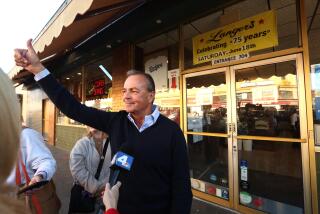Caruso sees that raising the minimum wage can have a maximal effect
- Share via
Things just weren’t working out for Anthony Henry in 2010. Although he had no trouble finding work, he didn’t make enough to rent an apartment, so he lived in his car.
“I parked in West L.A. under a tree,” said Henry. “I’d walk from the car to The Grove because I didn’t have enough money for gas.”
Henry earned minimum wage at a department store in the shopping center, working first in the coffee shop and later in men’s clothing. At the coffee shop, he got to know a couple of employees from Caruso Affiliated, which owns The Grove, and asked them to keep him in mind if any jobs opened up.
That led to a 12-hour weekly job as a Grove concierge at $11 an hour. But he still held on to his $8-an-hour job at the department store, and, one day, in walked Rick Caruso.
“He wanted to order some pocket squares,” said Henry, referring to the little hankies that poke out of the breast pocket of a suit.
They got to talking, and Caruso took a liking to the young man.
“I was impressed that he was working two jobs,” said Caruso. “You meet him and he’s the most incredible guy.”
So late in 2011, Caruso made Henry a full-time concierge, with healthcare benefits and a 401(k). At that point, Henry was finally able to move into a place with a friend, and he just recently got his own apartment.
“I couldn’t make a better ambassador for our company at The Grove,” Caruso said.
Henry, 27, now manages the concierge division, with a salary rather than an hourly wage. But he hasn’t forgotten how big a difference it made to get a few more dollars per hour. And in 2012, when he went from $12 an hour to $13, he was ecstatic. He went home and did the math on the take-home difference and what it would mean when he went out with friends or to the store.
“It really helps your morale,” said Henry, who recently passed along the news of $1 hourly raises to the dozen concierges who now work under him in customer service.
Caruso, whose shopping centers and other investments have made him a billionaire, has had his dust-ups with organized labor, but lately he’s been speaking up in favor of increasing the minimum wage in Los Angeles and beyond. Last week, Seattle beat L.A. to the punch when the city’s mayor signed into law a phased-in increase to $15 for all industries as one means of addressing income inequality.
In Los Angeles earlier this year, the City Council called for a fiscal impact study of a proposed increase to $15.37 for employees of hotels with 100 or more employees. That report came back Friday with few surprises, echoing the long-standing opposing views on the effects of minimum-wage increases.
Employees would obviously benefit, and their increased buying power would have a ripple effect, said the report. But the trade-off could be a hiring slowdown or even layoffs, as well as a decline in hotel profits and/or higher room rates.
City Councilman Mike Bonin, who proposed the wage increase, says the benefits outweigh the costs.
“The difference this makes in the lives of housekeepers is huge,” he said, whereas the effect on hotel profits is potentially negligible.
Roxana Tynan of the Los Angeles Alliance for a New Economy argued that past wage increases for hotel workers near the airport and in Century City did not adversely affect employment or profits.
“This is an extremely profitable sector that has extremely low-wage workers who are working hard but living in poverty,” she said.
Despite his support for a minimum-wage increase, Caruso doesn’t like the way Los Angeles is going about it. He thinks picking one industry is arbitrary and unfair, and that it could drive hotel development out of the city.
He’d prefer a county increase, or a bigger state hike than the one passed last year, which will raise wages to $10 an hour by 2016. But he also said that legislating pay isn’t necessarily the best way to go. He said the city should offer discounts or temporary exemptions from business taxes in exchange for paying higher wages or creating jobs. Such incentives should be flexible enough, he added, to allow for disparities in the size and profit margins of local businesses.
Caruso, no doubt, can afford to pay top dollar. He has a domestic staff of more than 12 full-time employees at his home, and said he pays them at or above industry standards, along with benefits and perks that include cars in some cases.
In a region teeming with wealthy residents who flock to fundraisers for President Obama or some feel-good international cause, Caruso is instead often heading east and south, writing checks for nonprofit community groups focusing on healthcare and education. He said his sons and daughter have volunteered at those nonprofits, learning valuable lessons about income inequality, grace and humility.
As for his corporate employees, Caruso told me he has “a selfish interest” in making sure they make a living wage and have healthcare for their families. It’s an investment in loyalty, he said, and it helps minimize the cost of recruitment and training, all of which feeds his bottom line.
“When the employees are happy and the customers are happy, we do better,” he said.
As for Anthony Henry, Caruso said he has the potential to become one of his senior executives one day.
“He worked his way up on his own, so we’ve given him a scholarship to go back to school. It’s a great example of where you give some hope to somebody and they take off.”
More to Read
Sign up for Essential California
The most important California stories and recommendations in your inbox every morning.
You may occasionally receive promotional content from the Los Angeles Times.














